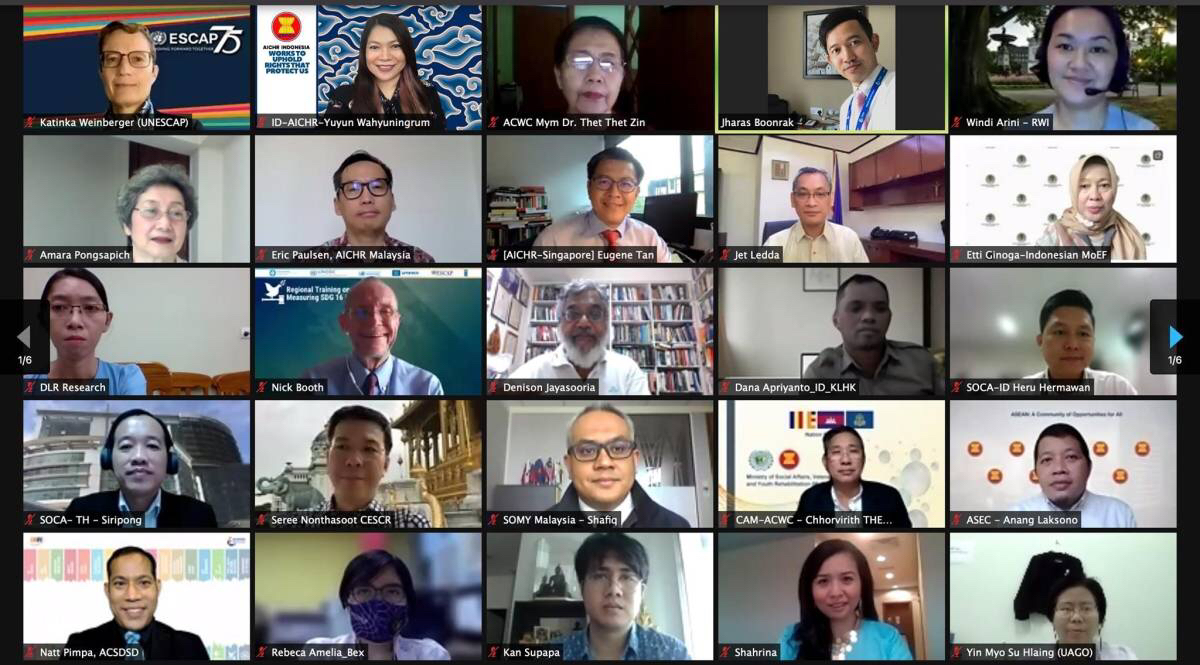
AICHR holds workshop to enhance human rights mainstreaming in achieving SDGs, foster stakeholders partnership

BANGKOK, 12 November 2021 – The ASEAN Intergovernmental Commission on Human Rights (AICHR) held the “AICHR Workshop on Human Rights, SDGs, and ASEAN Recovery from COVID-19” on 8 to 9 November via video conference.
The workshop discussed the mainstreaming of human rights in the implementation of SDGs, which are intrinsically aligned with the ASEAN Vision 2025, with consideration to the context of post- COVID-19 recovery.
In his opening remarks, Thailand’s Ministry of Foreign Affairs Deputy Permanent Secretary Chutintorn Gongsakdi commended AICHR’s workshop as timely and relevant, as COVID-19 had exacerbated existing development and human rights challenges, with vulnerable groups severely affected. Innovative ways to promote human rights and advance the development agenda thus should be explored with the aim to leave no one behind.
The scope of the programme’s discussion covered current progress and issues pertaining to SDGs implementation in ASEAN region, regional initiatives to mainstream human rights into the Goals pertaining to environment, gender equality, children’ rights, the linkages of UN Guiding Principles on Business and Human Rights (UNGPs) and SDGs, and partnership for sustainability.
The workshop highlighted that, despite progress, there are still a number of challenges since the adoption of SDGs in 2015, in the ASEAN region such as the data gaps on SDGs and human rights. Among others, the workshop also stressed the need to consider the civil society organizations (CSOs) roles in contributing to the improvement of data collection and analysis.
In light of the pandemic and other emergencies, mitigation and recovery plans need to be reviewed and improved on issues of vulnerable populations. The session on UNGPs indicated that the guiding principles can provide direction on how to implement SDGs, and emphasised that businesses should respect human rights transparently and totally in their performance. Partnerships are essential in actualising SDGs on the ground and are the most effective way in moving forward together.
In her closing remarks, Prof. Dr. Amara Pongsapich, Representative of Thailand to AICHR, concluded that ASEAN must work on improving data collection methodology and analysis to move forward. In addition, coordination with stakeholders on the ground and participation of affected communities, amid the pandemic, is vital. ASEAN needs to ensure that the definition of vulnerable groups is inclusive.
Over 120 participants were in attendance, including government officials from ASEAN Member States working on economic and development planning, labour, environment, social development, as well as representatives from ASEAN Secretariat, ASEAN Sectoral Bodies, National Human Rights Institutions, UN agencies, CSOs, and academic institutions.
AICHR Thailand hosted the Workshop, in collaboration with the United Nations Development Programme (UNDP) and United Nations Environment Programme (UNEP).
